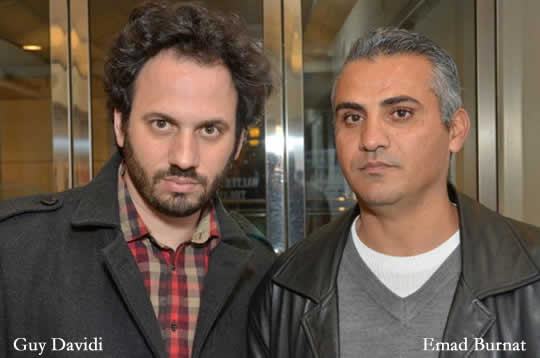 5 Broken Cameras, a film directed by Palestinian filmmaker Emad Burnat and Israeli activist Guy Davidi, has been nominated for the Best Documentary Feature Oscar.
5 Broken Cameras, a film directed by Palestinian filmmaker Emad Burnat and Israeli activist Guy Davidi, has been nominated for the Best Documentary Feature Oscar.
An extraordinary work of both cinematic and political activism, 5 Broken Cameras is a deeply personal, first-hand account of non-violent resistance in Bil’in, a West Bank village threatened by encroaching Israeli settlements. Shot almost entirely by Palestinian farmer Emad Burnat, who bought his first camera in 2005 to record the birth of his youngest son, the film was assembled by Burnat and Israeli co-director Guy Davidi. Structured around the violent destruction of each one of Burnat’s cameras, the filmmakers’ collaboration follows one family’s evolution over five years of village turmoil. Burnat watches from behind the lens as olive trees are bulldozed, protests intensify, and lives are lost. “I feel like the camera protects me,” he says, “but it’s an illusion.”
Bijan Tehrani: Please tell me how you came up with the idea for 5 Broken Cameras.
Emad Burnat: I started in 2005 filming and documenting the struggle in my village and following the events. I decided to take my camera and to be part of the struggle first. Early on, I met people in the village who came to make films and people who came to participate in the action and they were asking me for footage. I gave them footage because I was the only one who filmed in the village, the only one who stayed there and lived there who had a camera. The idea came from one of my friends who said I should make a film about the village and about my personal story because I as well as my friends and family was affected by this… so I started focusing on my friends, my son Gibreel growing up, and the idea came very early to make this personal film – a different kind of documentary from my perspective, because I lived there. I did this from my feelings, because I know what it is to live there in this situation. Nobody can do this film from personal experience if he hasn’t lived the situation for many years. I wanted to make something about the daily life, the resistance, how people live there, how the children grow up there, through my son’s eyes.
BT: How was working with Guy on this film as the co-director?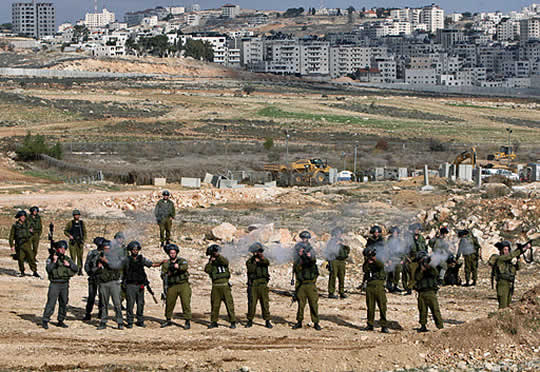
EB: I was filming for five years first and creating the film from the beginning and following the characters, my son, myself and my family. So I proposed him after five years to help on the production because I know him as an Israeli activist who came to participate in the demonstrations, he believed in our rights. I asked him as a friend, as a human, not as an political figure and not as a deal between two states. So the goal was not to make an Israeli/Palestinian film, it was for him to come and help finish the film. He came and gave some ideas about the construction, the editing, and he helped to get funds for the film.
BT: How did you manage to have people in your village to participate in your film?
EB: I live there and we live in a small village so the village is like one big family. I was not looking for characters; they are all my friends, my close friends since when we were children. When I decided to make it personal, I decided to follow my son Gibreel because it is very important to show the normal life that people live, not just the political issues or violence. I wanted to inform the people about our reality and our truth. It’s about my life – everything is related to me. My wife also supported me and she was also worried about what was happening to me because one after one, my cameras were shot, and time after time I was injured or arrested. She wanted to help and support.
BT: It’s very nice because without taking sides and showing people as evil, the film shows the reality of this war and how difficult it is for people who want to live a peaceful life. I think it is important your co-director is from Israel because now people can’t say your film is from one point of view. I think this makes the film so important.
EB: I think what makes the film important and what made it successful is only the story. It’s a story about life, about reality. The point is not because it’s Israeli and Palestinian. He came to the village as an Israeli activist. I asked him to help with the project as a friend, as a human, not to make it an IsraeliPalestinian project. So when you watch the film and the story, it’s very clear that it’s from my personal perspective and that is what makes the film strong.
BT: What do you think of your chances of winning the Academy Award for Documentary feature?
EB: Just to reaching the Oscars is a big success for the film, for the story, for the people and for the non-violent struggle. It’s a very big success. The Oscars will draw a lot of attention to the Palestinian issue. If the film wins the Oscar, it will be a very big day, a historic day for the Palestinian people, it would be the first time a Palestinian documentary wins an Oscar so it’s very important.
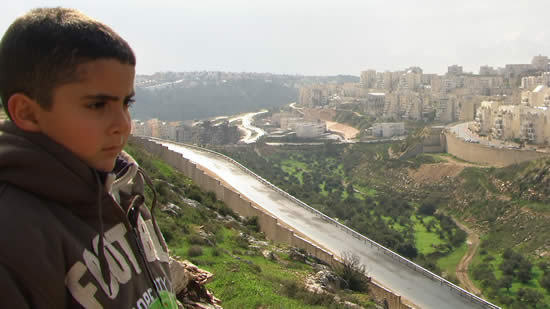 BT: What has been the reaction to the film in the places where you have shown it?
BT: What has been the reaction to the film in the places where you have shown it?
EB: I’ve been showing the film in different countries, different places all over the world and the reaction has been good because people feel that they are inside the story, they aren’t just watching, it’s not just a film. So the reaction has been good and very strong everywhere. The film was shown in Palestine, in Ramallah, and the reaction was good, very strong.
BT: Has it been shown in Israel also?
EB: Yes, it’s been shown in Israel also, in cinema festivals, on TV and I’ve seen some good reactions but there are also many bad reactions from the audience in Israel.
BT: What is your next project now as a filmmaker?
EB: I continue filming and following the kids and what happens in the village and the other places. I will see what the new idea is. Maybe it won’t be just political but something different.
***
BT: How did you first encounter the subject of 5 Broken Cameras?
Guy Davidi: I’ve been an Israeli activist from 2003, so I’ve been going to the West Bank to participate in demonstrations against the separation clans and the colonization, in different villages from the North to the South. And then when the movement reached Bil’in, I came to support the people quite early with other Israeli activists. In 2005, as a filmmaker, I discovered in this village the people are so generous and so open, specifically towards us Israeli activists. I felt that this place was very unique because there was such a strong connectivity in the demonstrations, so I wanted to stay there more. Since there were other filmmakers working on making films on this issue and the subject was already mediatized a lot, I tried to look for other angles to touch the story of the non-violent movement. So my first short film was about construction workers that used to work in the building of the settlement in Kiriyat Sefer. Some of them lived in Bil’in and they were demonstrating against the settlement but they were at the same time building it. I look for these kinds of stories.
My second film was a feature length documentary about the water issue and for that film, Interrupted Streams, I actually lived in Bil’in for more than two months, and during that time I spoke with many people about all kinds of issues to give me inspiration for my narration. It was a tough thing for an Israeli to do – most Israelis there would just participate in the demonstrations but it allowed me to penetrate into the lives of people there. It was also a sensitive time because of the elections between the Hamas and the Fatah, people didn’t know the effect the election would have. 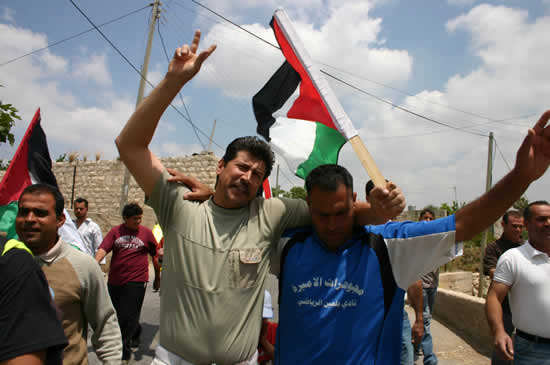
In that period of time, I met Emad and he was filming in the village. He was not thinking of doing films for many years. He was doing some video activism, later on he sent some of his footage to news agencies for television. Then I think he realized he should make films but he realized he needed someone to work with because he was not a filmmaker and he called me onto the project. At the beginning, I didn’t want to join the project because I didn’t think of myself as a producer and I also didn’t want to hijack the story and talk about my point of view because I think what’s needed is the point of view of a Palestinian. The footage he showed me wasn’t really showing a personal story; it was something that was picked up on the way later. The moment I realized Emad should be the center of the film was… well, I knew about all that had happened to him, the hospital, the accident… I told him his camerawork would inspire people and he accepted that. The moment I knew we had a film was when he showed me footage of an old man walking someone to prison and I asked him who it was and he said it was his father. I asked how he felt in that moment as a cameraman and how he experienced things. From that moment on, he became the center of the film. For me, it was also a political decision because here I was, an Israeli filmmaker promoting a film in which I was empowering Emad’s voice. I think that was good for the film, and good politically.
A lot of footage was shot the first year to connect personal stories and social issues. At that time, he had some footage of Gibreel but he never chose Gibreel as a character so that first year he filmed a lot of footage of Gibreel and also Soraya and I was writing the narration based on conversations that we had and editing, and the last six months we worked with a French editor, Véronique Lagoarde-Ségot.
BT: I think this is what is really needed in the Middle East – your relationship that is based on trust and trying to trust each other while working together. That was a good example of how people can come together and resolve issues.
GD: I’m not sure exactly we always resolved things. Throughout the process and until now, we are facing each other and nothing is ideal. The problem is that we become a symbol of the Israeli and the Palestinian and it’s very dangerous to be a symbol because you cannot live up to the expectations of people for this symbol. But of course, there is a basic understanding and trust between us and politically we are mostly on the same page. I think what is challenging in our relationship is being the outsider in the project, my role is never understood. I think for Emad it was very difficult to ask for my help. I think it’s connected to the fact that Palestinians are afraid to disappear – they are very connected to their land because of this fear. So I understand he really wants to own this film even though it’s put me in a sensitive position – I want to let him be the face of the story but I also have a lot of things to contribute.
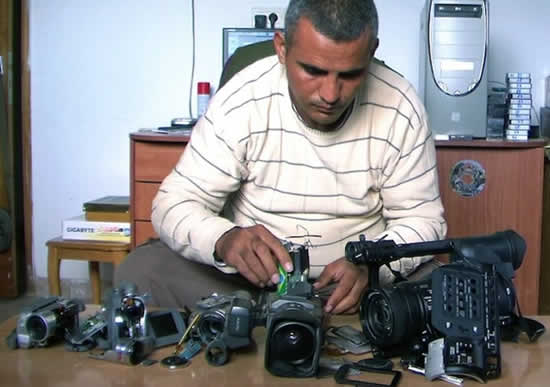 BT: I know that you guys faced some problems when you screened the film in Israel. While you had positive responses, you had many negative responses as well.
BT: I know that you guys faced some problems when you screened the film in Israel. While you had positive responses, you had many negative responses as well.
GD: Yes, there were a lot of negative responses. One time, someone from the audience stood up and said in front of everyone “in a normal country, someone like you would be behind bars” and half the audience applauded. It’s very hard to face that kind of reaction. I think it’s hard for Emad – he reads about the reactions on the internet and they’re very frightening, very cruel. This is also the kind of film that changes people’s lives. I’ve had people come up to me and say they had shifted from a right-wing opinion to not being sure where they were. I’m very hopeful that in a very modest way the film may have a tremendous effect in Israel. And the Oscar nomination is a big push because many people would not see the film otherwise.
BT: And I think the Oscar nomination is amazing because it shows that there is this tolerance, at least here where we didn’t think Hollywood would support a film like that. This was a very amazing move, I should congratulate the Academy myself for that!
GD: Yes, definitely! I think all this year’s films are very political and this is something that is changing. There is probably a tendency for people to voice their reaction more. Even in the fiction films, four of the selections are political films. There is a global tendency to become political again and raise important issues.
BT: Have you thought of showing the film at the US Congress?
GD: Everything has been organic as far as pushing the film. Up to now, we’ve pretty much achieved everything we wanted. We were thinking about it and I’m sure it will happen by itself. After an Oscar nomination, I don’t think people would allow themselves to miss it, it’s an important film.
BT: Also, what I have observed at least for the last decade, at least from Israeli cinema, is there are brave filmmakers who dare to have a different approach. Even “Waltz with Bashir” had a different viewpoint on war. I think there is a very intellectual movement in Israel.
GD: This is not something new. Israeli filmmakers and artists in general were feeling political issues. I think what happened was between 95 and 2005, there was a lot of despair due to the failure of the Oslo agreement so a lot of people became apolitical and it was harder to produce these kinds of films because the artists were not interested, the audience was not interested. And now I think it is part of a global movement connected with the Arab spring and the economical-social issues the world is facing. People are becoming political again so there is more openness to deal with these issues, and the result is films like “The Law in These Parts” and “The Gatekeepers”. I think these show a stronger tendency than “Waltz with Bashir,” which for me belongs to an old tendency in Israel which we call “shooting and crying” – we’re doing whatever we’re doing but we’re mourning about it, we’re tormenting ourselves – and this is almost a genre in Israeli cinema. So for me, films like “The Gatekeepers” and “The Law in These Parts” are much more important because they are creating a new way to look at Israeli reality in a journalistic way to crack the issues, rather just to deal with our traumas.
BT: How do you see the chances of winning the Academy Award?
GD: 1 in 5. I have no idea what’s going to come out.
BT: Great, I wish you luck and success. Are there any other projects that you are working on?
GD: I’m working on a project to distribute the film in Israeli schools. I’ve created the Indiegogo fundraising campaign (http://www.indiegogo.com/projects/bringing-five-broken-cameras-to-israeli-youth?website_name=5bcyouth). You can google it and see the documenting of the screening to Israeli youth. My plan for the future is to do something about the military service

